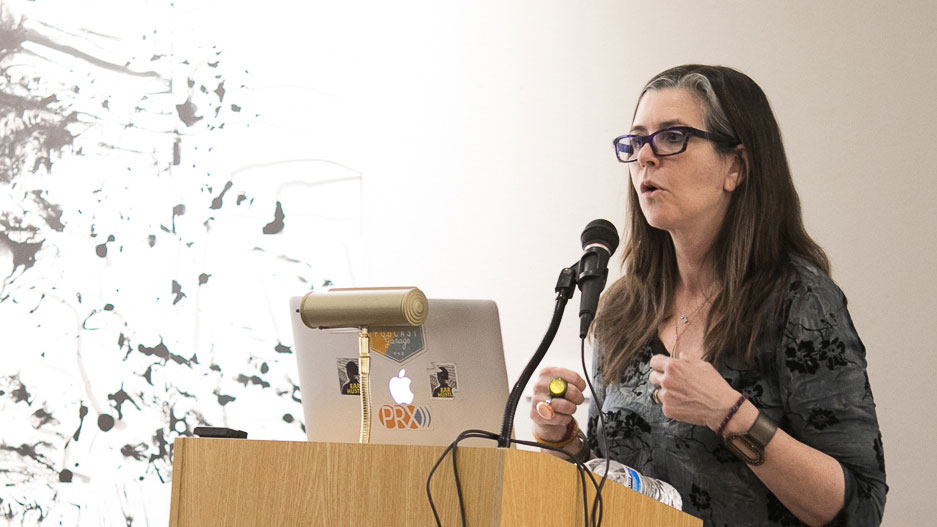 Sacramento State Professor of Photography Nigel Poor, seen here teaching, was Pulitzer finalist for her podcast about life inside San Quentin Prison. (Sacramento State/Andrea Price)
Sacramento State Professor of Photography Nigel Poor, seen here teaching, was Pulitzer finalist for her podcast about life inside San Quentin Prison. (Sacramento State/Andrea Price)
By Ahmed V. Ortiz
Nigel Poor held no aspiration of contending for a Pulitzer Prize, journalism’s highest honor. There’s a very good reason for this: although she co-produces, co-hosts and conducts interviews for Ear Hustle, a captivating podcast about life inside San Quentin State Prison, the Sacramento State professor of Photography will tell you herself she isn’t a journalist.
Another barrier was the absence of a category that fit podcasts. That changed this year, however, with the addition of audio reporting, in which season four of Ear Hustle was honored as a Pulitzer finalist.
“It wasn’t even on my mind at all,” said Poor, who with co-honorees Earlonne Woods and inmate Rahsaan Thomas submitted their work months ago. “It took everybody on the team, including me, by surprise.”
In addition to the Pulitzer honor, what began as what Poor called “a very humble idea” to tell stories about prison from the inside through inmates’ senses has become quite the business enterprise. When Ear Hustle began broadcasting in 2017, Poor was told that about 20,000 downloads per episode is a strong metric for successful podcasts. Within a month of the first episode, Ear Hustle had 1 million downloads. Poor estimated the average episode now is downloaded between 300,000 and 400,000 times within two weeks of first streaming, which she calls “shocking.”
It’s enough to have made Poor, Woods and fellow former inmate Antwan Williams, who performed sound design on the podcast before and after incarceration, paid employees of Radiotopia, which distributes the podcast. Not bad, considering Poor learned all she knows about podcasting by having started one. Woods, who was the show’s “inside” person when it began but had his 31-years-to-life sentence commuted by Gov. Jerry Brown in late 2018, didn’t even know what one was.
Poor’s association with San Quentin began in 2011, when she and Doug Dertinger, a fellow Sac State professor, volunteered to teach The History of Photography as part of the Prison University Project. In 2016 she embarked on a project involving thousands of historical negatives taken by San Quentin corrections officers over a 50-year period.
A middle-aged Caucasian woman raised in suburban Boston might seem a curious match for a podcast from the inside of a prison that has housed notorious criminals such as Charles Ng, Rodney Alcala and even Charles Manson. But Poor, always curious about storytelling and other people in general, wondered especially about prisons. Volunteering informed her idea of realities behind bars that went beyond the narrow portrait typically painted by TV and movies.
“We know so little about what actually happens in there,” she said. “So I feel like we all have a right to know, and the best way to know is to hear the story from the person who’s experiencing it.”
And she hasn’t felt threatened, pointing to an esteem in which volunteers are held by inmates. Because she came there to teach, the inmates who were her first San Quentin contacts were extremely receptive. “It’s still a prison and bad things happen in there,” she said, “but on the whole, I feel very well regarded there and I enjoy being inside the prison, which is weird to say, but I enjoy it because we’re doing good work.”
Poor intended what ended up as Ear Hustle to be a photography project, but cameras create complications behind prison walls. She then began volunteering in the prison’s media lab, where she connected with Woods, who liked the idea of a podcast. Early recordings ended up on Crosscurrents on KALW, a Bay Area public radio station. From there it was picked up by Radiotopia.
As with most things during the COVID-19 pandemic, Ear Hustle has had to adjust. Without access to locked-down San Quentin, Woods and Poor have had to shift to stories focused more on the outside, such as maintaining relationships with incarcerated partners. Poor said they hope to regain access to San Quentin by summer, but “nobody knows anything.”
It’s not their first adjustment on the fly. When Woods was freed after 22 years, it meant a new “inside” person was needed, which created an opening for Thomas. And, Poor said, they had to figure out what the show would be. After two decades behind bars, she said, “maybe he didn’t even want to think about prison anymore.” Thankfully, she said, he did and is energetically working on the show and advocating for reform of California’s “three strikes” law.
For her part, Poor, suddenly in a position she didn’t expect to land in, still is a photographer at heart. But, she laughed, “To be honest, the most pictures I take now are for Instagram.”
